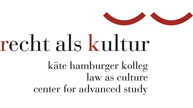Käte Hamburger Center for Advanced Study in the Humanities (KHK)
University of Bonn

After almost 13 years, the Käte Hamburger Center for Advanced Study in the Humanities "Law as Culture" has reached the end of its maximum term as planned on December 31, 2022, and has finished its work at the Bonner Bogen. We would like to thank all friends and supporters, colleagues and the 130 Fellows from all over the world for their wonderful cooperation in trying to better understand law as culture in the context of globalization.
Please note that the addresses and phone numbers listed on the homepage are no longer valid (with the exception of the phone numbers of Prof. Dr. Dr. h.c. Werner Gephart, 0228/73-54053, Dr. Stefan Finger, 0228/7354051, and the fax number 0228/73-54054). The former board of directors and management of the Center can still be reached at the following e-mail addresses: dethloff@uni-bonn.de, w.gephart@uni-bonn.de, clemens.albrecht@uni-bonn.de, finger@uni-bonn.de.
The Käte Hamburger Center for Advanced Study in the Humanities “Law as Culture” intends to contribute to an understanding of law at a time when the world’s normative orders have become subject to rapidly progressing globalization. Whereas the quid-juris-question is the focus of jurisprudence in general and legal dogmatics in particular, we want to utilize the conceptual and methodological means of the Humanities in order to render the law comprehensible as an important dimension of a globalizing world. In this regard, and vis-à-vis earlier standards of discussion in the 19th century, law is to be rediscovered as a legitimate object of cultural analysis with important implications for contemporary concerns and problems.
Just as knowledge of religious world views and its dynamics allows for an understanding of a conflictuous world, law holds a kind of indicative function for the paths and meanders of a global modernity. A center of this modernity can no longer be determined, neither empirically nor normatively. Only deeper comprehension of those religiously inflected and decentralized legal cultures – prototypically analyzed in the works of Max Weber – can illuminate the specifics of occidental legal cultures. The very intertwinement of the law with those cultures’ basic presuppositions, for example, in the Arabic-Islamic world, is what demands and allows for harnessing the analytical potential of those disciplines engaged in cultural studies. This includes a historical-comparative analysis of the law, which, in emphasizing its symbolic-ritualistic and organizational dimensions, continues the traditions of the Humanities in Germany, in order to refine, to apply and to complement them in course of a dialogue with representatives of other legal cultures. Since this type of analysis is relieved from the quid-juris-question which usually circumscribes the limits of judicial decision-making, one can expect from it new insights into a fundamental fact of social life under the conditions of globalization.
In contradistinction to Max Weber’s emphasis of differences in his reconstruction of legal cultures, intertwinement, hybridization and partial fusion of legal cultures harbor potential for conflict as well as reconciliation. Literature, film, architecture, visual arts, and maybe even dance have their own story to tell about this state of the law. Its negation by regimes of unjustness highlights what precious achievement the law represents in the process of civilization. This becomes particularly clear when facing the law’s latent culturalization, where the attainments of modern legal cultures are threatened to be negated ‘in the name of culture’.